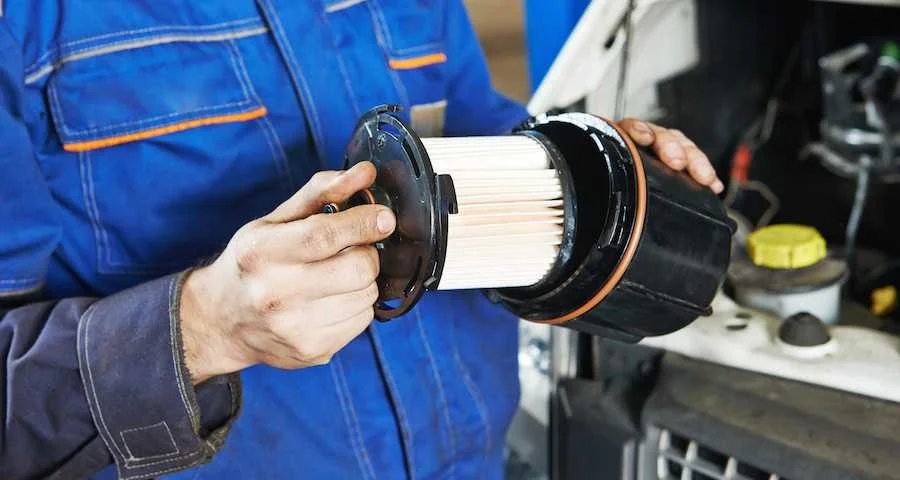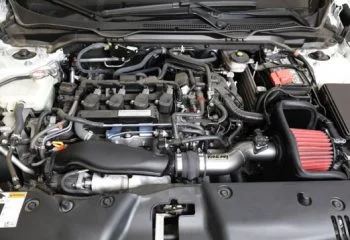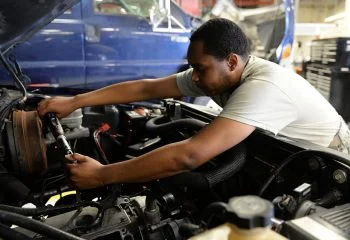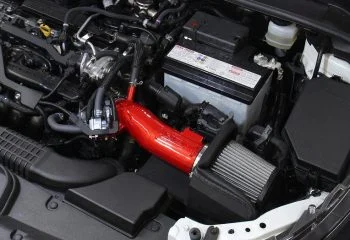When it comes to car maintenance, one of the most commonly overlooked tasks is changing the fuel filter.
Many people don’t think about it until there’s a problem, but it’s important to know how often to change fuel filter and why.
Here’s everything you need to know about fuel filters and how often they should be replaced.
What's in this post?
How Often to Change Fuel Filters
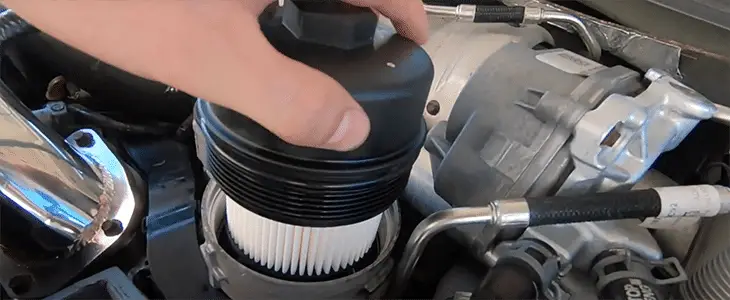
Every car has a fuel filter, and it is important to know how often to change it.
The fuel filter is responsible for keeping debris and contaminants out of the engine. Over time, the filter can become clogged, which can cause the engine to run poorly.
Additionally, a dirty fuel filter can lead to decreased fuel economy.
Depending on the age and make of your car, you might need to change your fuel filter more or less often.
For most cars, the fuel filter should be replaced every 20,000-30,000 miles. It’s about 1.5 – 2 years for the average driver. Newer cars can have fuel filters that last much longer, up to 60k miles.
However, it’s important to consult your car’s owner’s manual for specific recommendations, as some cars may have different intervals.
Replacing the fuel filter is a relatively simple task that can be done at home with little difficulty. However, if you are not comfortable doing it yourself, you can always take your car to a qualified mechanic.
Either way, making sure your fuel filter is clean is an important part of keeping your car running smoothly.
What are signs you need to change your fuel filter?
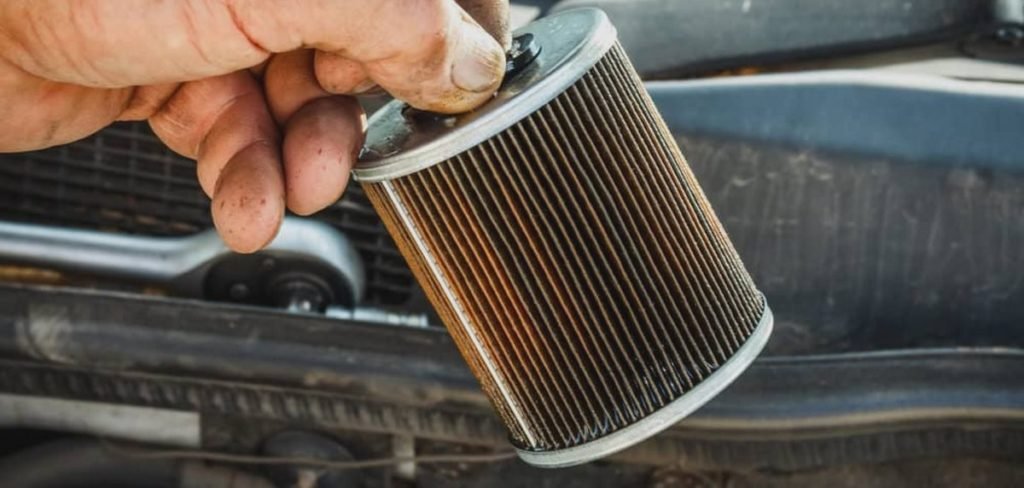
There are several ways to know when your fuel filter needs to be changed.
One way is to simply check the owner’s manual for your vehicle and see when the manufacturer recommends changing the filter.
Another way is to pay attention to how your vehicle is running. If you notice that your vehicle is starting to hesitate or stall, it could be a sign that the fuel filter is becoming clogged and needs to be replaced.
You may also notice a decrease in fuel economy if your fuel filter is dirty. If you have any concerns about whether or not your fuel filter needs to be changed, consult a qualified mechanic for an inspection.
If you notice any of the following signs, it’s time for a new fuel filter:
- Your vehicle is hard to start
- Your engine is sputtering or misfiring
- You’re seeing a decrease in fuel economy
- Your vehicle is stalling or hesitating
How important is fuel filters
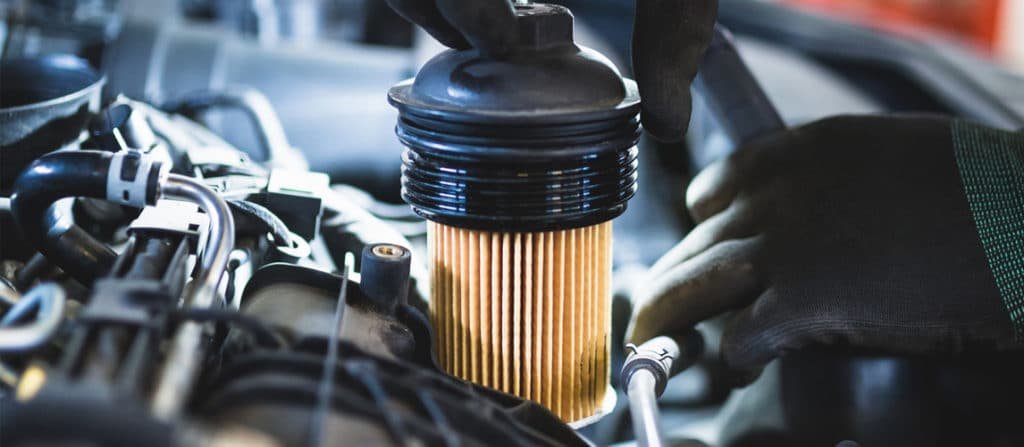
Fuel filters play an important role in ensuring that your engine runs smoothly. Over time, dirt and debris can build up in your fuel tank, clogging the fuel lines and causing your engine to run less efficiently.
In extreme cases, a clogged fuel filter can even cause your engine to stall. For this reason, it’s important to check your fuel filter regularly and replace it as needed.
By keeping your fuel filter clean, you can help to ensure that your engine will run smoothly and efficiently for years to come.
How to Maintain Fuel System
One of the most important systems in your car is the fuel system. It’s responsible for getting gas from the tank to the engine, and if it isn’t working properly, your car won’t run. That’s why it’s important to keep your fuel system clean and free of debris.
Cleaning fuel system at every 30000 miles will help to ensure you get the most out of your vehicle’s fuel system, to keep your engine performing like new. Here is what you should do when maintaining fuel system.
Decarbonizing Engine
Decarbonizing your engine is important for a number of reasons.
First, it helps to remove deposits that can build up over time and impact the performance of your engine.
Second, it allows the valves to work correctly, which in turn increases the absorption of fuel.
Third, it helps to improve the efficiency of your engine by breaking up the carbon and allowing it to be burned more completely.
Overall, decarbonizing your engine is an important part of regular maintenance that can help extend the life of your engine and improve its performance.
Throttle Body Cleaning
The throttle body is a butterfly valve located between the air intake filter and the intake manifold.
Its purpose is to open or close, based on the speed determined by the vehicle driver by pressing the accelerator.
However, over time fuel varnish can build up in the throttle body, which prevents the butterfly valve from closing completely.
This results in decreased idle speed and overall fuel economy. In order to prevent this from happening, it is important to clean the throttle body on a regular basis.
This will help to ensure that the butterfly valve can close completely, resulting in better idle speed and fuel economy.
Fuel Injection
Over time, fuel can build up on the small needle or ball of the injector, causing poor engine performance.
Fuel injection cleaning is a process that removes these deposits, restoring the injector to optimal condition.
The cleaning solution is typically injected under high pressure, shattering the deposits and flushing them away.
In some cases, the entire injector may be removed and disassembled for cleaning. Fuel injection cleaning is an important part of routine vehicle maintenance, and can help to improve engine performance and fuel economy.
Fuel Tank Additive
As anyone who has ever dealt with a car that won’t start knows, water and gasoline don’t mix.
Water can cause all sorts of problems in a car’s fuel system, from clogging up the fuel filter to corroding the fuel pump.
That’s why it’s important to use a fuel tank additive like gas line antifreeze. Gas line antifreeze is designed to remove water from gasoline, keeping your fuel system clean and dry.
Simply add a bottle of gas line antifreeze to your gas tank every time you fill up, and you’ll help keep your car’s engine running smoothly.
You can do these maintenance by yourself if you are familiar with the process, or you can take it to a professional service provider. Either way, maintaining your fuel system is an important part of keeping your car running smoothly.
FAQs
What happens if I don’t change my fuel filter?
If you drive a car with an old fuel filter, it can cause unpredictable behavior and longer cranking times before starting.
How do I keep my fuel filter clean?
One of the best ways to keep your fuel filter clean is to use a fuel additive that contains injector cleaner.
This will help to remove deposits from the fuel injectors, which will in turn help to keep the fuel filter clean.
You should also avoid using low-quality fuel, as this can increase the amount of debris that ends up in the filter.
How much does a fuel filter cost?
The average price of a fuel filter replacement service is between $50 and 175, but if you’re handy under the hood with tools in your car- repair can be done for as low as $10 to 70.
Will a new fuel filter improve performance?
The cost of fuel has been steadily rising over the past few years, which means many drivers are looking for ways to improve their car’s efficiency. One way you can do this without sacrificing performance or power is by changing your filter!
Changing out those dirty old filters with new ones will not only make sure that both emissions systems work properly but also increase how quickly cars accelerate when taking off from stop signs because there won’t be any blockages holding back all that potential energy.
What does a clogged fuel filter sound like?
A clogged fuel filter might cause the engine to run poorly and make a knocking or ticking loud noise after it has been warmed up.
When this happens, the engine doesn’t have as much pressure. This will cause noise when you’re driving on a surface with low resistance, such as sandstone paving stones.
Are fuel filters need to change more often than oil filters?
Some people believe that fuel filters need to be changed more often than oil filters. The reasoning is that since fuel is pumped through the engine at a much higher pressure than oil, it is more likely to cause wear and tear on the filter. In addition, fuel filters are typically located near the bottom of the car, where they are more likely to become clogged with dirt and debris.
As a result, they may need to be changed more often to ensure that they are operating properly. Changing oil filter is fairly easy, but if your oil filter is stuck, then you may want to read our guide on how to remove a stuck oil filter safely.
How long does it take to change a fuel filter?
You might need to wait 10-20 minutes for the fuel filter replacement.
Can you clean a fuel filter without removing it?
No. If you try to clean a fuel filter without removing it, you may damage the filter. It’s best to follow the manufacturer’s instructions on how to replace or clean the filter.
Will a bad fuel filter throw a code?
There are a number of different trouble codes that can apply when the fuel filter is blocked. These include low pressure, failure to follow all steps in proper procedure, and/or lack thereof resulting in an unable start-up or even worse yet; no power at all!
The problem could also stem from an oxygen sensor malfunction which would cause hesitation while accelerating during warm weather months since more gas isn’t getting through efficiently enough without one being accurate enough for this type of situation.
What are some popular oil filter brands?
Today, there are many different brands of oil filters available on the market. Some of the most popular brands include Purolator, Microgard, and Fram. When choosing an oil filter, it is important to select one that is compatible with your car’s make and model. In addition, you should also consider the climate in which you live.
For example, if you live in a cold climate, you may want to choose an oil filter that has a higher cold-weather rating. Similarly, if you live in a hot climate, you may want to choose an oil filter that has a higher hot-weather rating. Ultimately, the best oil filter for your car will depend on your individual needs and driving conditions. We have written up an article about who makes Microgard oil filters, make sure you check it out.
Can I change my fuel filter with a full tank?
No. You should change your fuel filter with an empty tank. This will help you avoid any spillage.
Will check engine light come on if the fuel filter is bad?
Sometimes the Check Engine Light will come on because of a fuel filter problem. This might be caused by clogged filters or low pressure in your car’s tanks.
This is detected through sensors that monitor the system’s overall integrity, like air conditioning components that are too far away from where they should be relative to each other. Drivers might not realize it when this happens!
Sum up
We hope that this blog post has helped you to understand how often you need to change your fuel filter.
It is important to keep your car in good condition by following the manufacturer’s recommended service intervals, and changing your fuel filter is one of the most important things you can do for your vehicle.

